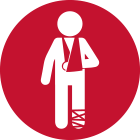Workers in traditional jobs like construction, health care, teaching, and retail sales are usually considered to be employees of the company for which they work. If you are an employee and are injured on the job, your employer’s workers’ compensation insurance should pay for your medical care and a portion of your lost wages, if you are unable to work. What about workers in non-traditional jobs? For example, what about those who work from home? Or those who use their own vehicles for work, such as drivers of companies like Uber or Lyft? The following considers who pays for injuries when a worker is injured in an unusual setting.
Distinguishing Between Independent Contractors and Employees
 The first thing that must be done when determining who should pay for a worker’s injury is to define the worker as either an independent contractor or as an employee. This distinction is very important. While employers are covered under workers’ compensation benefits in North Carolina, independent contractors are not. The North Carolina Industrial Commission explains that employers must only carry insurance if they employ three or more employees.
The first thing that must be done when determining who should pay for a worker’s injury is to define the worker as either an independent contractor or as an employee. This distinction is very important. While employers are covered under workers’ compensation benefits in North Carolina, independent contractors are not. The North Carolina Industrial Commission explains that employers must only carry insurance if they employ three or more employees.
Unfortunately, sometimes unethical employers will improperly misclassify employees as independent contractors in an attempt to avoid providing the workers certain benefits, such as workers’ compensation insurance. If you are classified as an independent contractor, it is important to be certain that this classification is correct. You cannot recover workers’ compensation benefits if you are an independent contractor.

The good news for independent contractors is that while employees are barred from filing lawsuits against their employers to recover damages for work-related injuries, independent contractors have that legal option available. If you are an independent contractor and are harmed during the course of your job, you may a legal right to bring a civil suit against the person or business for whom you were working if you were harmed as a result of negligence.
Many workers in non-traditional jobs are independent contractors rather than employees. Those who work for themselves, set their own hours, and are in charge of their own projects are often independent contractors. For example, Uber and Lyft drivers are classified by the companies for which they work as independent contractors. Some states including North Carolina have endorsed the ride-sharing business mode. According to a Reuters article, North Carolina has passed legislation designating drivers working for transportation network companies such as Uber and Lyft as independent contractors.
Determining if the Injury Was Work-Related
 When it comes to figuring out who will pay for a worker’s injury, another question that must be considered is whether the injury was work-related. According to the Insurance Journal, North Carolina lawmakers recently passed a bill that would require ride-share companies to carry liability coverage on private cars owned by the independent contract drivers. This means that in the event of an accident, the liability insurance would help to pay for injuries. But determining when the insurance would apply is more complicated. The driver would have to be performing a work-related task at the time that he or she was involved in an accident. The article published in the Insurance Journal reads that the liability coverage would apply when the drivers are transporting customers or waiting for jobs.
When it comes to figuring out who will pay for a worker’s injury, another question that must be considered is whether the injury was work-related. According to the Insurance Journal, North Carolina lawmakers recently passed a bill that would require ride-share companies to carry liability coverage on private cars owned by the independent contract drivers. This means that in the event of an accident, the liability insurance would help to pay for injuries. But determining when the insurance would apply is more complicated. The driver would have to be performing a work-related task at the time that he or she was involved in an accident. The article published in the Insurance Journal reads that the liability coverage would apply when the drivers are transporting customers or waiting for jobs.
Do I Have a Workers’ Comp Claim?
 Workers’ comp claims can be complicated, especially if you do not know whether or not your employer carries workers’ compensation or if you are eligible for workers’ compensation benefits. If your employer does not offer workers’ compensation benefits, and you believe that he or she should, you consult with an experienced workers’ compensation claims attorney for legal assistance.
Workers’ comp claims can be complicated, especially if you do not know whether or not your employer carries workers’ compensation or if you are eligible for workers’ compensation benefits. If your employer does not offer workers’ compensation benefits, and you believe that he or she should, you consult with an experienced workers’ compensation claims attorney for legal assistance.
In addition to determining whether you are covered by workers’ compensation through your job, you must also determine whether the injury was work-related. For example, if you are an employee who works from home and have a slip and fall accident when answering a work-related call, will workers’ compensation be liable for the injuries? Generally speaking, you would need to prove that you were performing a work-related task at the time of accident. Each accident has its own unique facts that require evaluation.
If how your injuries were incurred is up for debate, an employer may deny your workers’ compensation claim. If this happens, you should work with a lawyer who can give you advice on appealing a denied claim and to what benefits you are entitled. Sometimes, other insurance forms may help to pay for your injuries, such as car insurance or health insurance. Remember, you may also have the right to file a civil action. For example, if you are an Uber driver who is attacked by a passenger, you may be able to pursue both criminal and civil litigation against an attacker– the latter of which can yield compensation for your injuries.
How a Raleigh Personal Injury Lawyer Can Help You
 You may need a personal injury lawyer or workers’ comp lawyer. Raleigh’s lawyers at Hardison & Cochran Attorneys at Law can help you when you have been injured on the job. For workers in unique jobs, like ride-sharing, getting hurt at work can become a very complicated process. Determining where to turn for financial help after a work-related accident can be overwhelming without legal guidance from a North Carolina workers’ compensation attorney. To get answers to your questions about who should pay for your injuries and other losses, having a legal professional review your accident and explain your legal options.
You may need a personal injury lawyer or workers’ comp lawyer. Raleigh’s lawyers at Hardison & Cochran Attorneys at Law can help you when you have been injured on the job. For workers in unique jobs, like ride-sharing, getting hurt at work can become a very complicated process. Determining where to turn for financial help after a work-related accident can be overwhelming without legal guidance from a North Carolina workers’ compensation attorney. To get answers to your questions about who should pay for your injuries and other losses, having a legal professional review your accident and explain your legal options.
At Hardison & Cochran, Attorneys at Law, a workers’ compensation attorney will sit down with you to discuss your case and provide you with legal advice free of charge. If you want to move forward with your claim, we can help you to file your claim, gather evidence, and prove fault depending upon the type of claim. We will remain on your side throughout the entire process so that you know that you have an advocate whom you can trust. Call us today or contact us online to schedule your free case consultation now.




Leave a comment